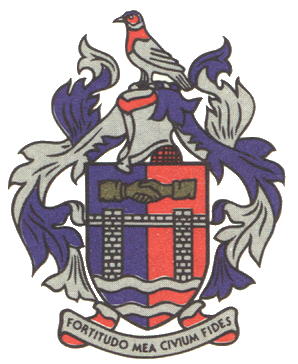Volksrust: Difference between revisions
Knorrepoes (talk | contribs) No edit summary |
Knorrepoes (talk | contribs) m (Text replace - "[[Literature" to "{{media}} [[Literature") |
||
| Line 15: | Line 15: | ||
====Origin/meaning==== | ====Origin/meaning==== | ||
The shield tells a story about the Third Swaziland Convention, signed in December 1894 by President Paul Kruger and the British High Commissioner, Sir Henry Loch. Neither of them was willing to negotiate on the other's territory, so the railway bridge over the Grensspruit (border stream), marking the border between the [[Zuid-Afrikaansche Republiek]] (ZAR) and Natal, was chosen as a neutral venue. A railway coach was placed in the middle of the bridge (today called the Convention Bridge), straddling the middle of the stream. The two statesmen could then sit at the conference table, each on his own soil. The bridge was proclaimed a historical monument in 1954. The wavy barrulets symbolise the stream. The clasped hands symbolise Kruger and Loch and the agreement they reached over the future of Swaziland. That state became a protectorate under the auspices of both the ZAR and Britain. Britain became the sole protector in 1900, following the annexation of the ZAR. | The shield tells a story about the Third Swaziland Convention, signed in December 1894 by President Paul Kruger and the British High Commissioner, Sir Henry Loch. Neither of them was willing to negotiate on the other's territory, so the railway bridge over the Grensspruit (border stream), marking the border between the [[Zuid-Afrikaansche Republiek]] (ZAR) and Natal, was chosen as a neutral venue. A railway coach was placed in the middle of the bridge (today called the Convention Bridge), straddling the middle of the stream. The two statesmen could then sit at the conference table, each on his own soil. The bridge was proclaimed a historical monument in 1954. The wavy barrulets symbolise the stream. The clasped hands symbolise Kruger and Loch and the agreement they reached over the future of Swaziland. That state became a protectorate under the auspices of both the ZAR and Britain. Britain became the sole protector in 1900, following the annexation of the ZAR. | ||
{{media}} | |||
[[Literature]] : Scan from first day cover; Background from Mike Oettle. | [[Literature]] : Scan from first day cover; Background from Mike Oettle. | ||
Revision as of 08:28, 9 July 2014
| Heraldry of the World Civic heraldry of South Africa |
VOLKSRUST
Province : Mpumalanga (previously Transvaal Province)
District Municipality : Gert Sibande
Local Municipality : Seme
Origin/meaning
The shield tells a story about the Third Swaziland Convention, signed in December 1894 by President Paul Kruger and the British High Commissioner, Sir Henry Loch. Neither of them was willing to negotiate on the other's territory, so the railway bridge over the Grensspruit (border stream), marking the border between the Zuid-Afrikaansche Republiek (ZAR) and Natal, was chosen as a neutral venue. A railway coach was placed in the middle of the bridge (today called the Convention Bridge), straddling the middle of the stream. The two statesmen could then sit at the conference table, each on his own soil. The bridge was proclaimed a historical monument in 1954. The wavy barrulets symbolise the stream. The clasped hands symbolise Kruger and Loch and the agreement they reached over the future of Swaziland. That state became a protectorate under the auspices of both the ZAR and Britain. Britain became the sole protector in 1900, following the annexation of the ZAR.
Contact and Support
Partners:
Your logo here ?
Contact us
© since 1995, Heraldry of the World, Ralf Hartemink 
Index of the site
Literature : Scan from first day cover; Background from Mike Oettle.











